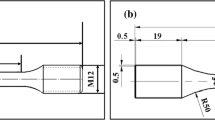Abstract
Recent demands for high performance ceramics and glass for various applications from bioceramics to cutting tools under fluctuating stress conditions has focussed attention of the scientific community towards fatigue behaviour of brittle solids. Attention to fatigue phenomena in alumina ceramics phenomenological to metals, having an endurance dependent on applied stress with a limit at around 50% of the single cycle fracture stress, was first drawn by the author in late sixties. Slip assisted fatigue process was not considered to be dominant in ceramic materials due to the absence of appreciable crack tip plasticity. With the background of this general survey of fatigue behaviour some fatigue studies based on mode of testing, theoretical and experimental analyses and fractographic evidence have been presented. Studies have shown that there is a dormant period between each successive crack advancement during which the residual stress and a plastic component is built up in a cumulative manner leading to eventual failure. During fatigue\(\sigma _{p_j } \) (plastic) and\(\sigma _{p_j } \) (residual stress) components are predominant for ductile metals and brittle glass/ceramics respectively.
It is also apparent that dislocation assisted plastic component as a contributing factor in the failure of brittle materials under fatigue cannot be ruled out.
Similar content being viewed by others
References
Ainsworth L 1954J. Soc. Glass Technol. 38 479
Banerjee R and Sarkar B K 1995Glastech. 6 177
Chaudhuri J, Ram M L and Sarkar B K 1994J. Mater. Sci. 29 3484
Chen E H and Black J 1980J. Biomed. Mater. Res. 14 567
Congleton J and Petch N J 1966Acta Metall. 14 117
Cutter I and McPherson R 1969Philos. Mag. 9 489
Dachille F and Roy R 1962Bull. Am. Ceram. Soc. 41 225
Gliies D C and Lewis D 1967J. Less Common Metals 13 179
Griffith A A 1920Trans. R. Soc. London A221 163
Guiu F 1978J. Mater. Sci. Lett. 13 1357
Gurney C and Pearson S 1948Proc. R. Soc. London A192 537
Horibe S and Hirahara R 1991Acta Metall. Mater. 39 1309
Huffine C L and Berger C M 1977Bull. Am. Ceram. Soc. 56 201
Irwin G R 1957J. Appl. Mech. 24 361
Jin Z Z and Ma J R 1986 inFracture mechanics of ceramics (eds) R C Bradt, A G Evans, D P H Hasselman and F F Lange (New York: Plenum Press) Vol 8, p. 101
Kingery W D 1959 inProperty measurements at high temperatures (New York: John Wiley & Sons) p. 185
Ko H N 1992J. Mater. Sci. Lett. 11 1711
Kossowsky R 1973J. Am. Ceram. Soc. 56 531
Lawn B R, Marshall D B, Antis G R and Dabbs T P 1981J. Mater. Sci. 16 2846
Lewis D and Lindley M W 1964J. Am. Ceram. Soc. 47 653
Lewis D and Wheeler E J 1969J. Mater. Sci. 4 681
Linde R K and DeCarli P S 1969J. Chem. Phys. 50 319
Maity Soumen, Choudhuri J and Sarkar B K 1994Trans. Indian Ceram. Soc. 53 1
Maity S, Chakraborty A K, Phani K K and Sarkar B K 1994 Indian Patent 165/DEL/94
Maity S and Sarkar B K 1995Int. J. Fatigue 17 107
McQueen R G, Jamieson J C and Marsh S P 1967Science 155 1401
Miner M N 1945J. Appl. Mech. 67 159
Mizushima J S and Knapp W J 1956Ceramic News 12 26
Ohji T, Yamauchi Y, Kanematsu W and Ito S 1990J. Ceram. Soc. Jap. 98 1063
Palmgren A 1924ZDVDI 68 339 (in german)
Pletka B J and Wiederhorn S M 1978 inFracture mechanics of ceramics (eds) R C Bradt, D P H Hasselman and F F Lange (New York: Plenum Press) Vol. 4, p. 745
Reece M and Guiu F 1990J. Am. Ceram. Soc. 73 1004
Reece M and Guiu F 1991J. Am. Ceram. Soc. 74 148
Sarkar B K and Glinn T G J 1969J. Mater. Sci. 4 951
Sarkar B K and Glinn T G J 1969Philos. Mag. 20 1285
Sarkar B K and Glinn T G J 1970Trans. Br. Ceram. Soc. 69 199
Sarkar B K and Towner J M 1971J. Mater. Sci. 6 182
Simons P Y and Dachille F 1967Acta Crystallogr. 23 334
Sparks A J and Hutchings I M 1992J. Mater. Sci. Lett. 11 918
Taylor E W 1950J. Soc. Glass Technol. 34 69
Vaughan D A J, Guiu F and Dalmau M R 1987J. Mater. Sci. Lett. 6 689
Walter A 1986 inAdvances in ceramics (eds) J R Varner and V D Frechette (Ohio: The American Ceramic Society Inc.) Vol. 22, p. 403
Weil N A 1961 Nat. Acad. Sc. Nat. Res. Council Rept. I1 152
Wiederhorn S M 1974 inFracture mechanics of ceramics (eds) R C Bradt, D P H Hasselman and F F Lange (New York: Plenum Press) Vol. 2, p. 623
Williams L S 1956Trans. Br. Ceram. Soc. 55 287
Williams L S 1961 inMechanical properties of engineering ceramics (eds) W Kriegel and H Palmour (New York: Interscience Publishers) p. 245
Author information
Authors and Affiliations
Rights and permissions
About this article
Cite this article
Sarkar, B.K. Fatigue of brittle materials—A critical appraisal. Bull. Mater. Sci. 18, 755–772 (1995). https://doi.org/10.1007/BF02744809
Issue Date:
DOI: https://doi.org/10.1007/BF02744809




